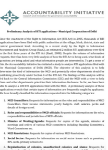
New RTI Act Rules Top Secret?
24 November 2010

It appears that the Government of India is attempting to draft a new set of Rules under the Right to Information Act, 2005. The minutes of a meeting held at the Central Information Commission (CIC) on 16th November 2010 indicate that it has been asked to comment on a set of draft RTI Rules prepared by the Government of India. Specifically, the minute’s state:
“Agenda 1: Draft RTI rules- for discussions
Commission discussed the draft rules and suggested some modifications. The changes as suggested by the Commission shall be incorporated and sent to the Government at the earliest. (Action: Secretary/JS (law)) “
In the 21st century where the RTI Act seeks to establish a regime of transparency, rules governing the processes of seeking and obtaining information are being discussed by only a handful of people behind closed doors. There is no official word on what the draft RTI Rules contain. Till date neither the Department of Personnel and Training (DoPT) the administrative department for the RTI Act, nor the CIC, have taken any steps to consult with the people of India on these draft Rules. The people of India are the primary stakeholders in India’s democracy and have a deeply vested interest in ensuring that there is transparency in the administration, especially in policy making and implementation. The secrecy surrounding the draft RTI Rules is in clear violation of two decisions of the CIC emphasising the duty of public consultation while drafting laws and policies. Whether the CIC has reminded the DoPT about the imperative of public consultation on these Draft RTI Rules in not publicly known.
Public Consultation is necessary while drafting legislation or policy: CIC directs the Delhi Government
In July 2010 a single member bench of the CIC directed the Government of the Delhi to fully comply with Section 4 of the RTI Act while formulating draft laws and policies. In this decision the CIC observed as follows:
“A plain reading of Section 4(1) (c) of the RTI Act suggests that every public authority is required to publish or disclose all facts and circumstances which are relevant and taken into account while formulating policies and taking decisions that would affect the public. Section 4(1)(c) of the RTI Act requires proactive disclosure of proposed laws/ policies and amendments thereto or to existing laws/ policies to enable citizens to debate in an informed manner and provide useful feedback to the government, which may be taken into account before finalizing such laws/ policies. Given that the DP Bill” (Delhi Police Amendment Bill) “is a significant legislative change, the relevant public authorities involved in drafting of the said bill had a duty to proactively disclose its contents under Section 4(1)(c) of the RTI Act… The public authority should have disclosed the contents of the DP Bill suo motu and by omitting to do so, the very purpose of Section 4(1) of the RTI Act stands defeated.
Public Consultation is necessary while drafting legislation or policy: CIC full bench directs the Central Government
In September 2010 a full bench of the CIC reiterated this stand and directed the Cabinet Secretariat under the Government of India and the DoPT to take steps to create a mechanism for public consultation on draft laws before they are tabled in Parliament. In this decision the CIC observed as follows:
“The Commission further recommends u/s 25 (5) that Cabinet Secretariat considers amending Part V of Circular No. 1/16/1/2000-Cab of 15.4.2002 to allow for public consultation in appropriate form.”
What does Part V of Circular No. 1/16/1/2000-Cab of 15.4.2002 contain?
The Cabinet Secretariat issued a circular in April 2002 instructing all departments and ministries under the Government of India on the methodology of preparation of Cabinet notes. Drafts of proposed laws or amendments to existing laws are attached to draft Cabinet notes and circulated to the relevant ministries and departments for consultation. Part V refers to the procedure for conducting such inter-ministerial consultations. During such consultations with various ministries the draft Cabinet note is circulated with the classificatory label – “TOP SECRET“. So save a handful of senior officers, all other citizens of India are excluded from this consultation process. The full bench of the CIC directed the Cabinet Secretariat to amend this portion of the circular and create appropriate spaces for public consultation.
Despite the principle of mandatory public consultation having been laid down by the CIC, the DoPT has not yet begun consultation with the people of India on the draft RTI Rules. If the draft is ready for consultation with the CIC which is a body outside of Government, surely it can be opened up for a more widespread consultation with the people of India who are using this law every day. Surely no harm would be done if people’s views are elicited on so important a subject. The Rules lay down the detailing of the framework for accessing information under the RTI Act. The people of India have a right to be consulted on the draft Rules as they are the primary users of the RTI Act. THE PEOPLE OF INDIA HAVE THE RIGHT TO BE CONSULTED NOW.
Venkatesh Nayak is the Programme Coordinator of the Right to Information Programme at the Commonwealth Human Rights Initiative, New Delhi. For CHRI’s alerts on the RTI and related issues click here.





